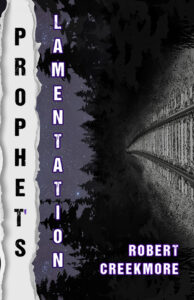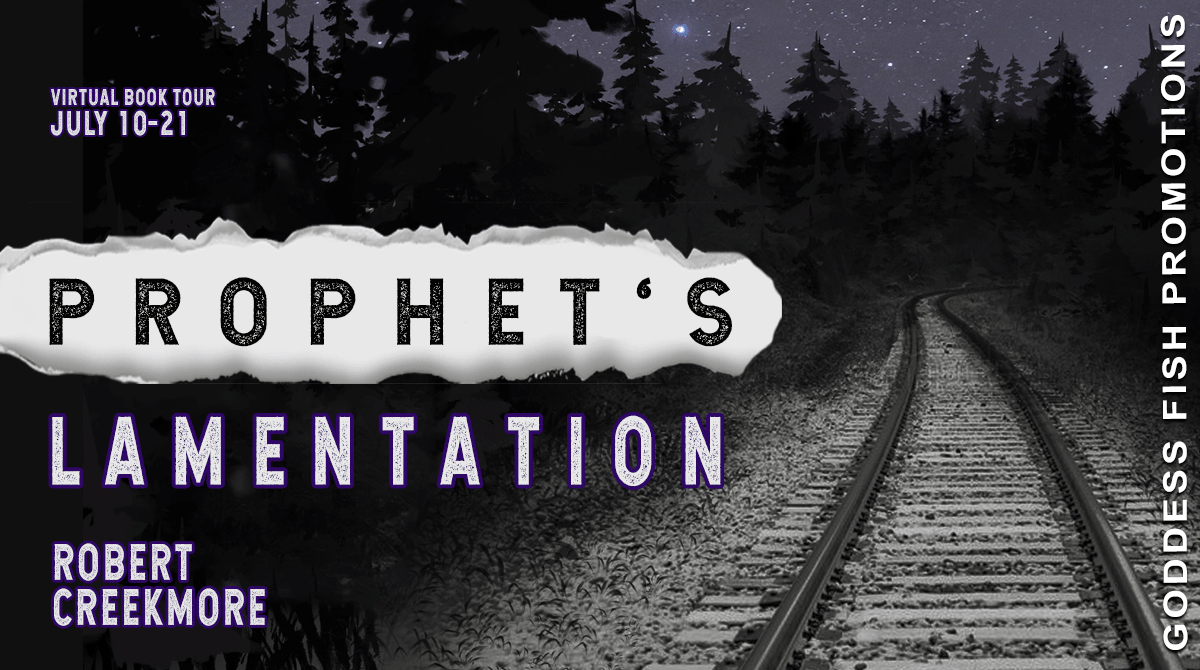A special welcome back to thriller author Robert Creekmore. Today we’re chatting about his new grit lit fantasy noir, Prophet’s Lamentation.

During his virtual book tour, Robert will be giving away a $10 Amazon or Barnes and Noble (winner’s choice) gift card to a lucky randomly drawn winner. To be entered for a chance to win, use the form below. To increase your chances of winning, feel free to visit his other tour stops and enter there, too!
Bio:
Robert Creekmore is from a rural farming community in Eastern North Carolina.
He attended North Carolina State where he studied psychology. While at university, he was active at the student radio station. There, he fell in love with punk rock and its ethos.
Robert acquired several teaching licenses in special education. He was an autism specialist in Raleigh for eight years. He then taught for four years in a small mountain community in western North Carolina.
During his time in the mountains, he lived with his wife Juliana in a remote primitive cabin built in 1875. While there, he grew most of his own food, raised chickens, worked on a cattle farm, as well as participated in subsistence hunting and fishing.
Eventually, the couple moved back to the small farming community where Robert was raised.
Robert’s first novel Afiri, is a science fiction love letter to his childhood hero Carl Sagan. It was nominated for a Manly Wade Wellman award in 2016.
Robert’s second novel is the first in a trilogy of books. Annoyed with the stereotype of the southeastern United States as a monolith of ignorance and hatred, he wanted to bring forth characters from the region who are queer and autistic. They now hold up a disinfecting light to the hatred of the region’s past and to those who still yearn for a return to ways and ideas that should have long ago perished.
Welcome back to Reviews and Interviews, Robert. Please tell us about your newest release.
Prophet’s Lamentation is a stand-alone sequel to last year’s release, Prophet’s Debt. It picks up two years after the events of Prophet’s Debt, which is a book that follows a young girl named Naomi Pace during her escape from a conversion camp after witnessing two murders. Eventually, she comes back for well-deserved revenge.
In Prophet’s Lamentation, Naomi is a young adult who’s doing her best to put together a life with her wife, Tiffany. But, the death cult she fought has coalesced around another leader who has found a way to harness supernatural abilities similar to her own. This new demi-god makes a priority of hunting down Naomi and her chosen family but they are well hidden.
This comes to a head on the occasion of Naomi’s twenty-seventh birthday. She’s celebrating at Spectrum, the only gay-friendly establishment in Wilmington, NC. She uses her abilities to prevent a friend from getting gay-bashed. In the process, the wrong person witnesses it, and the truth of her new identity finds itself back to the death cult.
Their new leader is a charismatic young man named Joseph. He’s done more than just harness abilities similar to Naomi’s, he’s created mindless, terrifying beasts to help him along the way. Naomi and her chosen family flee North Carolina.
But, it doesn’t take long before Naomi hikes through the backcountry of the Appalachian mountains, slips unnoticed into their heavily protected town, and goes to war with them using her sharp aim with a bolt-action rifle and the ability to change the characteristics of the Earth itself with her supernatural gifts.
What inspired you to write this book?
I started writing Prophet’s Debt as a form of therapy. I was surprised that it was not only chosen for publication but became a modestly popular cult book. I’ve had people tell me that Naomi is their hero. With the wind of appreciation at my back, I made it my goal to write a book with Naomi stronger than she’s ever been and set her loose to bring justice to those who rarely get it.
Excerpt from Prophet’s Lamentation:
Sweaty bodies move to the beat of house music, oblivious to anything but the rhythm and feeling. I personally don’t understand the appeal. My friends know this, which is why we walk around the dance floor and take the stairs behind the DJ booth to the rooftop. There are a dozen high-top metal outdoor tables, with four matching chairs at each. All of them have umbrellas that are closed, as it’s a clear, comfortable night. Directly across from the door is a covered bar. If you look over the edge of the roof by the stairs, you’ll see a courtyard hemmed in with a large stone wall. That also belongs to Spectrum. Like the rooftop, it gives those who want to have conversations without screaming over music a place to sit and drink.
Beyond the courtyard is a bar called The Helm, frequented by Marines. Across the street, facing both Spectrum and The Helm is a Baptist church that permanently has signs posted out front that say things like, ‘God hates queers,’ or ‘Matthew Shepard is burning in hell.’ We try to ignore them, but it still hurts.
I order a painkiller. Herschel has a Jameson served neat, and Nate, a dry gin martini. Tiffany has quit drinking altogether, so she’s our designated driver.
Herschel goes on about a new cannabis strain he bred. Even though we’ve gotten out of the illicit cannabis trade, he keeps a personal grow for himself and as medicine for his mom, Diane. After a few drinks, Nate is approached by a man named Claude, who asks to dance. Claude is five-foot-six, wiry, with dark hair, and thick eyebrows over an equally thick brow. He’s not a stranger. We’ve spoken to him a few times before. Nate takes his hand and is led enthusiastically by Claude back downstairs.
Herschel is approached several times. The men compliment his physique, and he loves it, though he never takes any of them up on their offers. I know Herschel is straight, but he never has a girlfriend. At this moment in his life, I believe he prefers compliments to commitment.
While Tiffany doesn’t drink, she does smoke cannabis and is now enthralled with Herschel’s impromptu presentation. I’m on my fourth drink.
That’s when I hear it.
“Nate,” I scream, as I leap to my feet!
Herschel immediately does the same, like a soldier reacting to the command of a superior officer.
“What is it?” Tiffany asks, still seated.
“Something is wrong. I can feel it,” I reply.
“Where,” Herschel responds.
“There, in the alley,” I say, pointing over the edge of the courtyard toward the building next to us.
We can’t see into the alley because of the stone wall.
“Let’s go,” Herschel shouts.
Tiff rises to her feet.
“No,” I say sternly, looking at my bride.
I can tell by the look on her face that Tiffany is pissed, but she knows I’m right.
Tiffany may be mentally strong, but she doesn’t have the constitution to deal with the trouble I sense.
Herschel leads the way, running toward the stairs. When we make it to the courtyard, we see that the security door has been propped open. Herschel runs into it at full force, causing it to smack against the wall as it swiftly articulates one-hundred-eighty-degrees. He turns right toward the alley, with me fast on his heels.
What’s the next writing project?
I’m currently writing the third installment of the Prophet’s Debt Trilogy. I’m also writing a supplemental novel, covering the eleven years Tiffany was separated from Naomi called Diary of Attrition. They’ll hit bookshelves in 2024 and 2025 successively. I have something planned for 2026 as well, but that will have to wait for another day.
What is your biggest challenge when writing a new book? (or the biggest challenge with this book)
I’m currently writing my fourth full-length novel. The biggest challenge is always the first one hundred pages. After that, it’s already large enough that the narrative almost has its own momentum.

If your novels require research – please talk about the process. Do you do the research first and then write, while you’re writing, after the novel is complete and you need to fill in the gaps?
I’ve lived an interesting life. For this book, I draw on my time spent living self-sufficiently in a primitive cabin built in the 1870s for two years in the remote Appalachian wilderness.
What’s your writing space like? Do you have a particular spot to write where the muse is more active? Please tell us about it.
I have a desk with an ultrawide monitor and a smaller supplemental one. This allows me to display three to four documents simultaneously. I use an old IBM key-buckling keyboard, which I’ve found to be the best, most durable keyboard ever made for novel writing. Occasionally, I use my laptop at the local coffee shop, but I prefer the solitude of my home office.
What authors do you enjoy reading within or outside of your genre?
I will always have a tremendous affection for Sylvia Plath, Carl Sagan, George Orwell, and Kurt Vonnegut. These days, I’ve been enjoying the works of J.G. Hetherton, Eryk Pruitt, Jeff VanderMeer, and S.A. Cosby.
Anything additional you want to share with the readers today?
You only live once. There’s likely nothing after this. Be kind where you can. Don’t waste your life chasing material goods. This will lead you into misery. Most corporate employers would piss on your face if it got them a bonus check. Live frugally so that you are as free as possible.
Thank you for coming back to Reviews and Interviews!
a Rafflecopter giveaway
